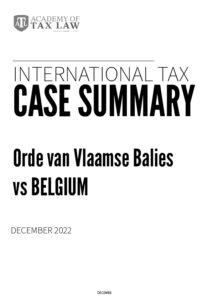Orde van Vlaamse Balies vs Belgium: CASE SUMMARY
Home » Case Library »
Orde van Vlaamse Balies vs Belgium: CASE SUMMARY
Case Information
- Court: Court of Justice of the European Union (Grand Chamber)
- Case No: C-694/20
- Applicant: Orde van Vlaamse Balies, IG, Belgian Association of Tax Lawyers, CD, JU
- Defendant: Vlaamse Regering (Flemish Government, Belgium)
- Judgment Date: 8 December 2022
- Download the FULL JUDGMENT
Judgment Summary
In Case C-694/20, the European Court of Justice (ECJ) examined the legality of certain reporting obligations imposed on lawyers under Council Directive 2011/16/EU (as amended by Directive 2018/822). This directive, commonly referred to as DAC6, requires intermediaries involved in potentially aggressive cross-border tax arrangements to report these transactions to the relevant tax authorities within 30 days. However, a critical issue arises with intermediaries who are lawyers, as they are bound by legal professional privilege. DAC6 provides an exemption allowing lawyer-intermediaries to abstain from reporting arrangements if doing so would infringe upon this privilege. The directive further mandates that these lawyer-intermediaries notify other involved intermediaries of their reporting obligations. This requirement to notify other intermediaries was contested in the Belgian Constitutional Court by the Flemish Bar Association and several tax lawyers, who argued that it infringed on the right to private life (Article 7) and the right to a fair trial (Article 47) under the Charter of Fundamental Rights of the European Union (Charter).
The ECJ ruled that Article 8ab(5) of Directive 2011/16/EU is invalid in situations where lawyers are required to inform non-client intermediaries of their reporting obligations. It concluded that such requirements infringe upon the confidentiality of lawyer-client communications, which is a fundamental aspect of legal professional privilege. The court’s decision emphasized that the directive’s transparency goals must be balanced against fundamental rights, especially in relation to the privacy of legal consultations. However, the court also clarified that this requirement does not impact the right to a fair trial as outlined in Article 47, given that this reporting obligation pertains to advisory functions, not litigation.
This decision has substantial implications for both multinationals and tax authorities, as it reinforces the boundaries of legal professional privilege in tax matters. While revenue authorities are keen to gather information on cross-border tax arrangements to curb aggressive tax planning, this judgment clarifies that legal professional privilege must be protected. Multinationals engaging in tax planning with legal advisers benefit from the assurance that confidential discussions remain protected, allowing them to seek advice on complex tax matters without concern for unwarranted disclosure.

